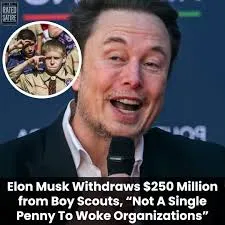#M818365ScriptRootC1336123 { min-height: 300px; }

In a bold and controversial move, Elon Musk has announced that he is withdrawing $250 million in funding from the Boy Scouts of America, stating, “Not a single penny to woke organizations.” This declaration has quickly stirred up discussions regarding corporate funding, social responsibility, and the implications of labeling organizations as “woke.”

Musk’s decision to pull his support has raised eyebrows and elicited strong reactions across social media and news platforms. Supporters of Musk argue that he is taking a stand against what they perceive as a growing trend of political correctness that they believe is undermining traditional values. They view his actions as a form of advocacy for organizations that prioritize innovation and merit over ideological alignment.
**Breaking: Elon Musk Pulls $250 Million from Boy Scouts, Declares ‘Not a Single Penny to Woke Organizations’**
In a move that has sent shockwaves through both the business and nonprofit sectors, Elon Musk has announced he is withdrawing $250 million in funding from the Boy Scouts of America. Musk’s declaration, “Not a single penny to woke organizations,” has sparked intense debate about corporate philanthropy, the nature of social responsibility, and the implications of labeling organizations as “woke.”
Musk, known for his outspoken views on various social issues, has often criticized what he perceives as excessive political correctness. His recent comments reflect a growing sentiment among some individuals who feel that traditional values are being undermined by a wave of progressive ideologies. Supporters of Musk view his decision as a bold stand against organizations that prioritize ideological conformity over merit and innovation. They argue that this move is necessary to protect what they see as fundamental American values.
On the other hand, critics have expressed deep concern regarding Musk’s choice to withdraw support from the Boy Scouts, an organization that has historically played a significant role in youth development. The Boy Scouts have made strides towards inclusivity, welcoming LGBTQ+ members and promoting diversity within its ranks. Many believe that these efforts reflect a commitment to creating a more accepting environment for all youth, regardless of their backgrounds or identities. From this perspective, Musk’s label of “woke” is not only misleading but also harmful, as it undermines the progress the organization has made in fostering inclusivity.
The financial implications of Musk’s withdrawal are significant. The Boy Scouts of America has faced numerous challenges in recent years, including declining membership and legal issues related to historical abuse cases. Losing $250 million in funding could severely impact their programs, which focus on leadership, community service, and character development. This funding is crucial for maintaining camps, outreach programs, and various initiatives that aim to engage young people positively.
Furthermore, Musk’s declaration raises questions about the future of corporate funding for nonprofits. Many organizations rely on donations from influential figures and corporations to sustain their operations and outreach efforts. Musk’s stance could lead to a chilling effect, where organizations may feel pressured to align with specific ideologies to secure funding, potentially stifling their missions and goals.
As this controversy unfolds, it highlights a broader cultural clash in society regarding the definition of “wokeness” and its implications. Some view “wokeness” as a necessary evolution toward greater social justice, while others see it as an encroachment on free speech and traditional values. This polarization poses a challenge for organizations like the Boy Scouts, which strive to appeal to a broad audience while navigating complex social dynamics.
Ultimately, Musk’s decision to withdraw support from the Boy Scouts is emblematic of a growing divide in societal values. The conversation surrounding this issue will likely continue, prompting discussions about the responsibilities of corporations and the role of philanthropy in promoting or challenging social norms. As stakeholders on all sides respond to this unfolding narrative, the future of organizations that aim to serve youth will be closely monitored, reflecting the ongoing evolution of societal values and expectations.


